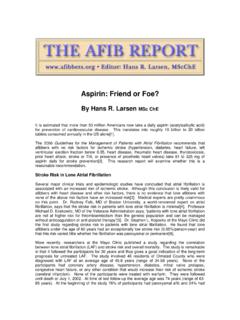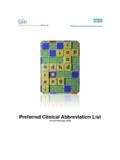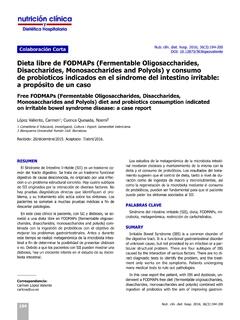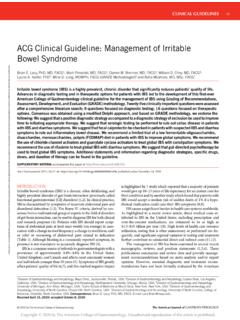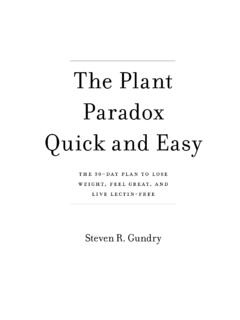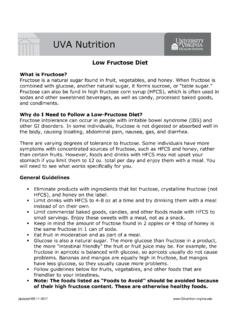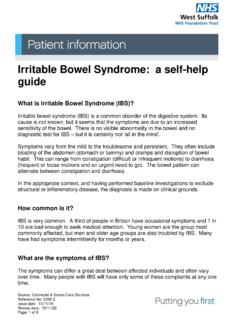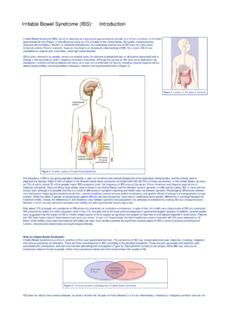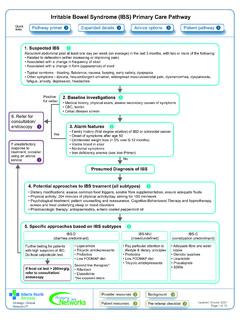Transcription of THE GUT CONNECTION TO AFIB - Afibbers.org
1 THE GUT CONNECTION TO AFIB. A Review of Digestion, GERD, Food Sensitivities, and Gut/Adrenal issues . many Influences for AF. BY JACKIE BURGESS RDH (RET). INTRODUCTION. It is estimated that 100 million people in the US suffer from some form of digestive dysfunction. Digestive and gastro-intestinal ailments have strong connections to systemic imbalances, many of which are commonly recognized as triggers for atrial fibrillation and have been discussed previously in numerous posts. This review is an elaboration of a few important connections that may be overlooked or ignored when addressing GI ailments. As you read, keep in mind the overall impact on the heart via the various mechanisms that are likely contributors to irritation, inflammation and interferences with electrical synchronization.
2 Digestive dysfunction has many faces and often involves several interconnected groups of associated abnormalities or imbalances that manifest in various ways with multiple symptoms meaning that addressing indigestion or irritable bowel is not usually as simplistic as just taking Tums or Imodium or PPIs and H2 blockers. Identifying and addressing underlying, contributing factors is the only sure path to achieving any meaningful progress. Some digestive ailments are easily reversed and others can be serious and complicated. Numerous, well-written books by experts in the field of Gastroenterology cover the details thoroughly. My goal here is to touch on or highlight some of the most common, yet important, points in this extensive topic so Afib readers dealing with digestive complaints can use as a guide.
3 A Functional, Restorative or Generative Medicine approach that examines all the underlying, potential contributors offers the most effective treatment plan. Functional Gastroenterology is an emerging field of new' medicine being formally integrated into practice in some areas of the country. The focus is to get back to the basics originally fostered by Hippocrates, the first holistic physician, who looked at Mind, Body, and Spirit in the individual's well-being and care compared to the Reductionist approach of current medicine today. [Quoted source: Interview with Gerard Mullin, Integrative Gastroenterologist see References]. Functional Gastroenterologists remind us that all organ systems function together as a web.
4 Addressing one system without the others typically does not resolve the entire problem . this would include the brain and the electrical system and since atrial fibrillation is a disturbance of the heart's electrical conduction system, it is important to keep in mind that this report merely covers a few factors that help weaken total-body electrical energy status (otherwise known as voltage); and, that by design, the body functions electrically. If it did not, then lifesaving efforts would not include the jump- start or re-boot by defibrillator or electro-cardioversion to reset arrhythmias to NSR or implanting pacemakers. This CONNECTION relative to digestive ailments, reactions to food sensitivities, toxic accumulations, the impact of unremitting stress on adrenal function and digestive impairment all contribute to a lowering of energy production and transmission.
5 Identifying and eliminating interferences is an important step in optimizing the functionality of the body; and, for afibbers, normal heart conductivity. While this report does not address the energy/voltage aspect, it would be incomplete and erroneous not to mention it lest it be ignored, dismissed or forgotten. Past posts have discussed the energy factor extensively and should be included in any total health overview. [Resources]. Neurotransmitters for Brain Function are a factor. Food cravings or food reactions are often imbalance indicators and relate to adrenal and other dysfunctions that directly influence GI function. Tissue pH is an important element in overall assessment and is most always overlooked other than to assume mistakenly that a person with digestive complaints has too much stomach acid and requires a remedy to prevent acid production.
6 The importance of tissue pH is far reaching. Acidic tissue pH supports many chronic disease conditions and fosters multiple GI problems. This is not to be confused with blood pH or even the pH required in the stomach during digestion. It's important to understand what this means for your particular situation. Stress factors are extremely significant and a fundamental contributor to digestive and intestinal disturbances. Continual, unremitting stress is a huge consideration that is not only contributory to various imbalances but often, directly causal. Vagus nerve irritation caused by digestive irritation/inflammation is a major consideration and important to address early in the sleuthing process since calming down the Vagus is a big step toward a peaceful heart.
7 And, in association with the Vagus, positional or postural influences are often triggers for Afib as well. Nutritionists and physicians practicing Functional Medicine (FM) indicate as high as 80% of patients' complaints can be traced to gastro-intestinal origins and include inadequate digestion food sensitivities and antigen responses dysbiosis leaky gut syndrome intestinal pathogens IBS. brain fog stress adrenal burnout or fatigue pH. ANS imbalances affecting Heart Rate Variability Symptoms of autoimmune disorders and aches and pains from arthritis. The pathogen, H. pylori, is known to contribute to arrhythmia. Today, unfortunately, large medical centers have moved away from looking for core causes and no longer use diagnostic tests that once were common.
8 Rather, the quick assessment and remedy is typically prescription or OTC drugs that mask symptoms while the root cause continues to smolder behind the scenes. A comment/observation by one seminar physician/participant noted that it's common in today's medical practice to prescribe PPIs for anyone with pain between the chin and groin.. Following is a cursory review of highlights (by no means complete or all-inclusive) from many hours of interviews with Nutritional and Functional Medicine practitioners treating digestive and gut-related issues. Other important related topics such as diverticular disease, fiber, Celiac, Crohn's, ulcerative colitis, ulcers, pancreatic insufficiency, gall bladder function, hiatal hernia, loose LES, Barrett's Esophagitis are not included.
9 These comments are not presented any particular order of importance since they all focus on connections that interfere with functional harmony. Some segments are note style to save space and for quick reading. As it is, this just barely scratches the surface of all the good GI info I wanted to share with you. The Resources section lists outstanding reference links to assist in sorting out your own digestive ailment along with important books focused specifically on the gut/digestion CONNECTION to health complaints. In complicated situations, typically, this is not a do-it- yourself project, but these resources can help readers become well-informed so they can advocate for themselves when interviewing medical professionals for treatment options.
10 As I frequently say: Knowledge is power but moreover, Knowledge is Health! Jackie January 25, 2013. DIGESTION, GERD, FOOD SENSITIVITIES, GUT/ADRENAL ISSUES MANY. INFLUENCES FOR AF. 1. Adequate chewing 2. Symptoms 3. Dysbiosis 4. Food Sensitivities 5. Lack of stomach acid 6. Leaky Gut syndrome (Intestinal Hyper-permeability). 7. Candida 8. Stress 9. Stress & Adrenal Dysfunction 10. Stress/Gut Glutamine Utilization Low Blood Sugar 11. Neurotransmitters and Brain Function 12. Remedies 13. References 14. Reading Resources 1. Adequate chewing healthy teeth The first rule for ensuring good digestion: Chew food thoroughly. Often forgotten in the rush to address other steps in the digestive process is the mechanical function of chewing food well which prepares food by grinding (mastication).
